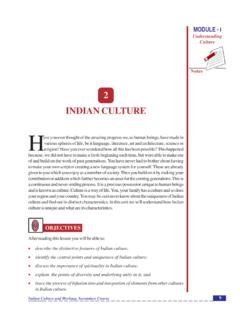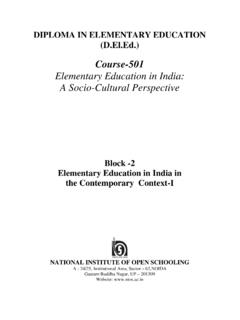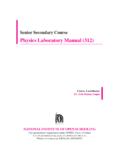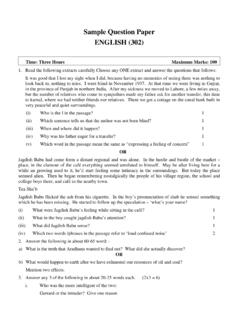Transcription of 8 RELIGION AND PHILOSOPHY IN ANCIENT INDIA A
1 RELIGION and PHILOSOPHY in ANCIENT INDIA MODULE - IV. RELIGION and PHILOSOPHY Notes 8. RELIGION AND PHILOSOPHY IN. ANCIENT INDIA . A. s soon as November and December come in we find new calenders flooding the market. Some calenders are very colourful. They are marked with different colours. Some even have small pictures on the dates. They are holidays and we look forward to them. You also look forward to them. Yes, they are religious festivals or national festivals and INDIA has plenty of religions that are flourishing. Processions on the road, good food, clothes, gifts, people worshipping in their religious places, wishing each other is a common sight.
2 Yes, INDIA is a beautiful, lovely and a lively country to be in. This is bacause RELIGION has always been a significant factor in influencing the lives of people in INDIA from the earliest times. It would, indeed, be very interesting to study RELIGION in its diverse forms through the various stages of its growth. The relationship between RELIGION and PHILOSOPHY has been an intimate one and hence their growth and development need to be studied in an interrelated manner. In this lesson you will study about the development of religions and PHILOSOPHY in ANCIENT INDIA . OBJECTIVES. After studying this lesson, you will be able to: explain the meaning of RELIGION .
3 Identify the characteristics of various religions movements in ANCIENT INDIA ;. explain the ideas of the six schools of Ved c PHILOSOPHY ;. examine the role played by the Charvaka School;. Indian Culture and Heritage Secondary Course 111. MODULE - IV RELIGION and PHILOSOPHY in ANCIENT INDIA RELIGION and PHILOSOPHY explain the Jaina theory of reality;. examine the contributions of Buddhist PHILOSOPHY . RELIGION . Notes RELIGION is the science of soul. Morality and ethics have their foundation on RELIGION . RELIGION played an important part in the lives of the Indians from the earliest times.
4 It assumed numerous forms in relation to different groups of people associated with them. Religious ideas, thoughts and practices differed among these groups, and transformations and developments took place in the various religious forms in course of time. RELIGION in INDIA was never static in character but was driven by an inherent dynamic strength. Every system of PHILOSOPHY in INDIA is a quest for Truth, which is one and the same, always and everywhere. The modes of approach differ, logic varies, but the purpose remains the same trying to reach that Truth. I am proud to belong to a RELIGION which has taught the world tolerance and universal acceptance.
5 We believe not only in universal toleration, but we accept all religions as true.. Swami Vivekananda at Parliament of world Religions in Chicago 1893. Indian spirituality is deeply rooted in ANCIENT philosophical and religious traditions of the land. PHILOSOPHY arose in INDIA as an enquiry into the mystery of life and existence. Indian sages called Rishis or seers', developed special techniques of transcending the sense and the ordinary mind, collectively called yoga. With the help of these techniques, they delved deep into the depths of consciousness and discovered important truths about the true nature of human being and the universe.
6 The sages found that the true nature of the human being is not the body or the mind, which are ever changing and perishable but the spirit which is unchanging, immortal and pure consciousness. They called it the Atman. The Atman is the true source of human's knowledge, happiness and power. The rishis further found that all individual selves are parts of infinite consciousness which they called Brahman. Brahman is the ultimate reality, the ultimate cause of the universe. Ignorance of human's true nature is the main cause of human suffering and bondage. By gaining correct knowledge of Atman and Brahman, it is possible to become free from suffering and bondage and attain a state of immortality, everlasting peace and fulfillment known as Moksha.
7 RELIGION in ANCIENT INDIA meant a way of life which enables a human to realize his true nature and attain Moksha. 112 Indian Culture and Heritage Secondary Course RELIGION and PHILOSOPHY in ANCIENT INDIA MODULE - IV. RELIGION and PHILOSOPHY Thus PHILOSOPHY provided a correct view of reality, while RELIGION showed the correct way of life; PHILOSOPHY provided the vision, while RELIGION brought about the fulfillment; PHILOSOPHY was the theory, and RELIGION was the practice. Thus in ANCIENT INDIA , PHILOSOPHY and RELIGION complemented each other. May we hear that which enlightens our minds, may we see Divinity everywhere, may we feel the presence of the Almighty within us and all the actions of our bodies Notes and minds be in the service of that Almighty Being; may we have peace unending'.
8 (Rig-Veda 1-89). PRE-VEDIC AND VEDIC RELIGION . From the archaeological findings in the pre and proto-historic sites it seems that these people believed in the sanctity of the creative force and venerated the male and female aspects of divinity. It appears that they were worshippers of the forces of nature like the sun and the moon. This belief is also partly substantiated by the early literature of the Aryans. The nature of the religious beliefs and practices of the Aryans is also known from the Rig Veda, They believed in many gods like Indra, Varuna, Agni, Surya and Rudra. Sacrifices, and ritual offering of food and drink to fire in honour of the Gods, constituted the main religious practices.
9 The Sama Veda and the Yajur Veda elaborated the different aspects of the sacrificial acts and this ritualism was further elaborated in the Brahmanas. The Atharva Veda contained a great deal of animistic beliefs. The seers entertained doubts about the utility and efficacy of the Vedic ritualism. Polytheism was challenged by monotheistic ideas and the various deities were introduced as different ways of naming one eternal entity. The Aranyaka and Upanishad sections of the Vedic literature envisage a progressive outlook. The Upanishads, represent the early stage in the origin and development of the religions- metaphysical concepts which were used later by the religious leaders and reformers of ANCIENT and medieval INDIA .
10 Some of them followed the traditional lines while others proceeded along the paths of unorthodoxy. INDIA down the ages attempted to grapple with the fundamental problems of life and thought. PHILOSOPHY in INDIA began with a quest after the highest truth- truth not as mere objective certitude, but as being closely linked with the development of personality and leading to the attainment of the highest freedom, bliss and wisdom. It demanded, therefore, not only a philosophical discipline of reasoning, but also a discipline of conduct and the control of emotions and passions. Thus the synthesis between deep philosophical analysis and lofty spiritual discipline is an abiding feature of Indian PHILOSOPHY and its outlook is entirely different from that of western PHILOSOPHY .









